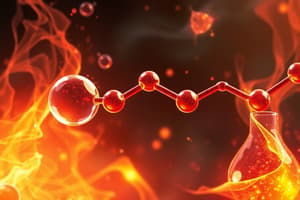Podcast
Questions and Answers
What is the relevant criterion for organic oxidation in organic chemistry?
What is the relevant criterion for organic oxidation in organic chemistry?
- Gain of oxygen and/or loss of hydrogen (correct)
- Gain of electrons and/or loss of protons
- Gain of hydrogen and/or loss of oxygen
- Gain of protons and/or loss of electrons
What happens to the electron density of a molecule in oxidations?
What happens to the electron density of a molecule in oxidations?
- It is increased
- It remains unchanged
- It fluctuates
- It is reduced (correct)
What does classical reductions in organic chemistry include?
What does classical reductions in organic chemistry include?
- Aldehyde reduction to alcohols
- Alcohol reduction to aldehydes
- Alkane reduction to alkenes
- Alkene reduction to alkanes (correct)
What do many oxidations involve in terms of hydrogen atoms?
What do many oxidations involve in terms of hydrogen atoms?
1.5
1.5
Flashcards are hidden until you start studying
Study Notes
Oxidation in Organic Chemistry
- The relevant criterion for organic oxidation is the loss of one or more electrons.
- In oxidations, the electron density of a molecule decreases.
Reduction in Organic Chemistry
- Classical reductions in organic chemistry include the addition of hydrogen or other reagents to a molecule.
- Many oxidations involve the removal of one or more hydrogen atoms from a molecule.
Studying That Suits You
Use AI to generate personalized quizzes and flashcards to suit your learning preferences.




